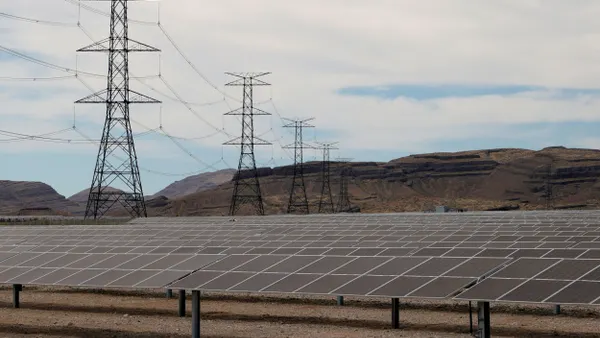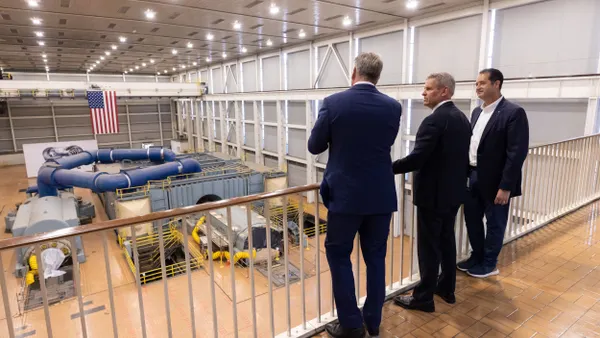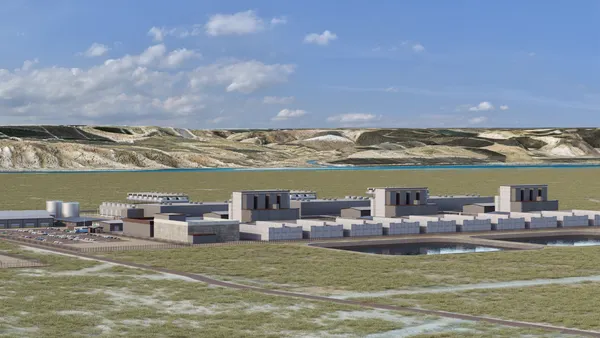Dive Brief:
- The acting chairman of the Federal Energy Regulatory Commission pledged not to "blow up the market" as his agency acts on a proposed rule from the Department of Energy to provide cost recovery to coal and nuclear plants.
- Chairman Neil Chatterjee said he was "sympathetic" to the aims of the cost recovery proposal, but wants the commission to "preserve our existing market structure" and ensure any reforms "withstand legal scrutiny and are legally viable." Chatterjee did not have a hand in crafting the proposal, he said.
- Chatterjee said FERC may not issue a final decision on the cost recovery proposal within the 60-day timeline requested by DOE. Other options include extending comments, calling technical conferences or issuing a new rulemaking order that supercedes the DOE proposal.
Dive Insight:
The phrase of the moment in federal power regulation is an ominous one: "Blow up the market."
Former FERC Chair Jon Wellinghoff first used it the day the DOE issued its Notice of Proposed Rulemaking, saying the plan would unravel the wholesale power markets that serve about two-thirds of the U.S. population.
“This would blow the market up,” Wellinghoff said, "and you can quote me on that."
Current Commissioner Robert Powelson picked the line up days later, telling an audience of PJM stakeholders that he "did not sign up to go blow up the markets."
"When that happens, we're done. I'm done; I don't need this job," he said. Commissioner Cheryl LaFleur later endorsed the statement on Twitter.
Now Chatterjee has addressed the issue as well, telling a group of reporters at a roundtable interview Friday morning that compensating fuel-secure generation is "not a zero sum game."
"Compensating for baseload generation does not equate to destruction of the markets," he said. "On the contrary I think it's a step toward accurately pricing the contribution of all market participants."
"My goal," he added, "is to land in that spot where we're looking to find a way to perhaps correct market deficiencies that aren't properly valuing the attributes of these assets in a legally defensible manner that doesn't blow up the markets."
Chatterjee, a former aide to Sen. Majority Leader Mitch McConnell (R-KY), has long supported the coal industry, saying in August the plants should be "properly compensated to recognize the value they provide to the system." But the chairman told reporters he did not have a hand in crafting the NOPR, and learned about it only the night before it was filed at FERC.
Pressed on what would constitute blowing up the markets, Chatterjee offered the example of "people leaving RTOs." That, he later clarified, referred to both states and individual generation resources.
Several analysts and energy regulators have expressed concern that a rule like the NOPR could slash prices in wholesale power markets for resources not granted cost recovery, leaving them with insufficient revenues and forcing them to shut down.
“There would not be competitive resources on the market if the rule's text is to be taken seriously,” Montana Public Service Commissioner Travis Kavulla said after the NOPR's release.
That situation, Chatterjee said, would amount to the type of market upheaval he hopes to avoid.
"If that were to be borne out, which I'm not saying it would happen, then that could constitute a disruption of the markets," he said.
But the most controversial provisions of the NOPR may never get that far. While FERC is "statutorily obligated" to respond to the DOE NOPR in 60 days, Chatterjee said FERC has "numerous tools at its disposal" to act, and they could include an outright denial or a new order that would supplant the NOPR.
"We could do an advanced notice of proposed rulemaking, we could do a notice of proposed rulemaking superseding the DOE NOPR, we could issue a final rule or an extension of the comment period and a solicitation of further comments," Chatterjee said. "We could convene technical conferences, we could do a notice of inquiry, we could initiate Federal Power Act Section 206 review proceedings, so there are many tools available to the commission to act within 60 days."
Section 206 of the FPA allows FERC to determine if power rules and regulations are unjust or unreasonable and "determine the just and reasonable rate" if so.
Chatterjee also indicated that FERC's assessment will encompass more than just the positive resilience aspects of coal and nuclear generators. At a House Energy & Commerce hearing on Thursday, multiple lawmakers coal-fired power plants are also prone to service disruptions from extreme weather, such as during the Polar Vortex, and the chairman expects those factors to be considered for the NOPR.
"[FERC] staff put out an exhaustive, extensive list of questions to facilitate this kind of dialogue," he said. "I fully expect comments in line with what you're laying out will come in."
DOE has repeatedly cited gas supply constraints during the Vortex as justification for the new 90-day fuel provision, but new research could complicate that picture. A university report published this week argues that two New England utilities artificially constrained gas pipeline capacity during the Vortex, cutting off up to 28% of gas that would have served generators from the Algonquin Pipeline in Connecticut and Massachusetts.
Researchers told Utility Dive they notified FERC of the findings, but Chatterjee and his staff declined to comment on whether the agency was aware of the issue or if it will play a role in the NOPR evaluation.
"We've seen the articles on that but we do not comment on outside reports," Spokesperson Mary O'Driscoll said.













